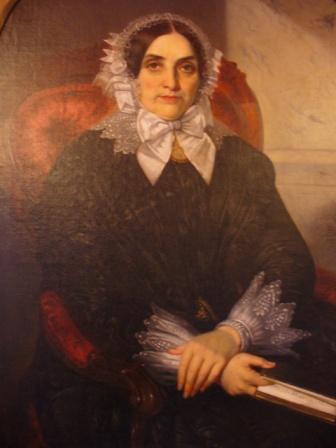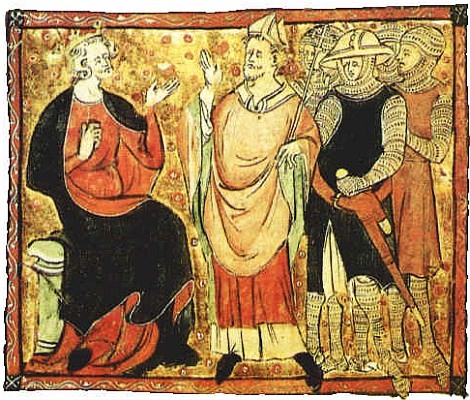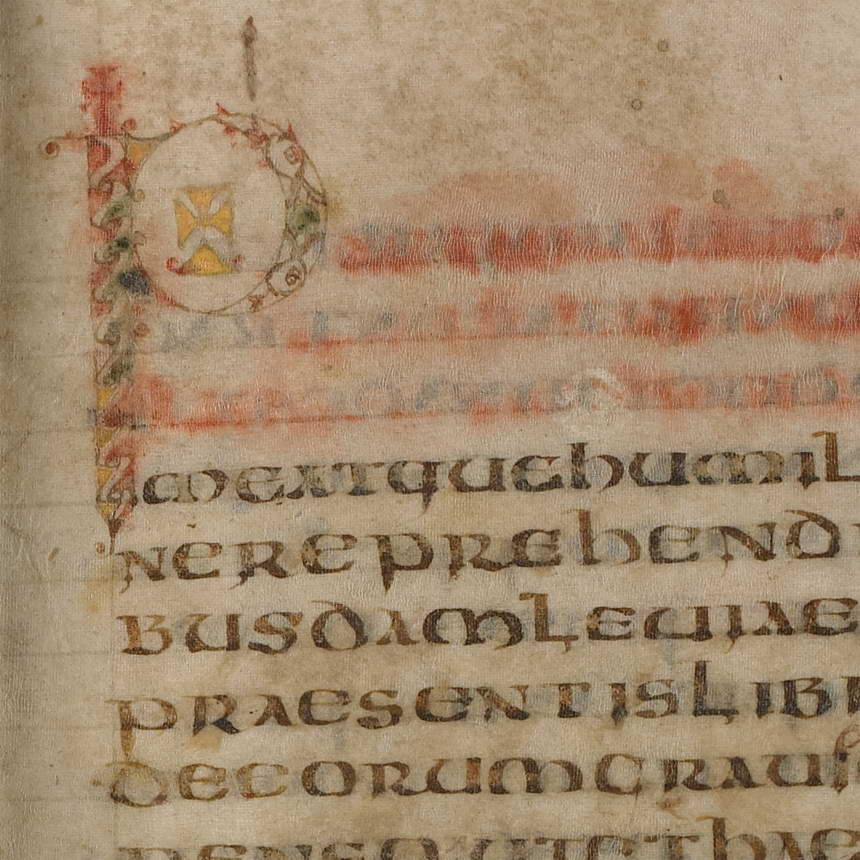|
Advowsons
Advowson () or patronage is the right in English law of a patron (avowee) to present to the diocesan bishop (or in some cases the ordinary if not the same person) a nominee for appointment to a vacant ecclesiastical benefice or church living, a process known as ''presentation'' (''jus praesentandi'', Latin: "the right of presenting"). The word derives, via French, from the Latin ''advocare'', from ''vocare'' "to call" plus ''ad'', "to, towards", thus a "summoning". It is the right to nominate a person to be parish priest (subject to episcopal – that is, one bishop's – approval), and each such right in each parish was mainly first held by the lord of the principal manor. Many small parishes only had one manor of the same name. Origin The creation of an advowson was a secondary development arising from the process of creating parishes across England in the 11th and 12th centuries, with their associated parish churches. A major impetus to this development was the legal exact ... [...More Info...] [...Related Items...] OR: [Wikipedia] [Google] [Baidu] |
Oxford English Dictionary
The ''Oxford English Dictionary'' (''OED'') is the principal historical dictionary of the English language, published by Oxford University Press (OUP), a University of Oxford publishing house. The dictionary, which published its first edition in 1884, traces the historical development of the English language, providing a comprehensive resource to scholars and academic researchers, and provides ongoing descriptions of English language usage in its variations around the world. In 1857, work first began on the dictionary, though the first edition was not published until 1884. It began to be published in unbound Serial (literature), fascicles as work continued on the project, under the name of ''A New English Dictionary on Historical Principles; Founded Mainly on the Materials Collected by The Philological Society''. In 1895, the title ''The Oxford English Dictionary'' was first used unofficially on the covers of the series, and in 1928 the full dictionary was republished in 10 b ... [...More Info...] [...Related Items...] OR: [Wikipedia] [Google] [Baidu] |
Seigneur
A seigneur () or lord is an originally feudal title in France before the Revolution, in New France and British North America until 1854, and in the Channel Islands to this day. The seigneur owned a seigneurie, seigneury, or lordship—a form of title or land tenure—as a fief, with its associated obligations and rights over person and property. In this sense, a seigneur could be an individualmale or female, high or low-bornor a collective entity, typically a religious community such as a monastery, seminary, college, or parish. In the wake of the French Revolution, seigneurialism was repealed in France on 4 August 1789 and in the Province of Canada on 18 December 1854. Since then, the feudal title has only been applicable in the Channel Islands and for sovereign princes by their families. Terms The English seigneur is borrowed from the French , which descends from Middle French , from Old French (oblique form of ''sire''), from -4; we might wonder whether there's a point ... [...More Info...] [...Related Items...] OR: [Wikipedia] [Google] [Baidu] |
Reformation
The Reformation, also known as the Protestant Reformation or the European Reformation, was a time of major Theology, theological movement in Western Christianity in 16th-century Europe that posed a religious and political challenge to the papacy and the authority of the Catholic Church. Towards the end of the Renaissance, the Reformation marked the beginning of Protestantism. It is considered one of the events that signified the end of the Middle Ages and the beginning of the early modern period in Europe. The Reformation is usually dated from Martin Luther's publication of the ''Ninety-five Theses'' in 1517, which gave birth to Lutheranism. Prior to Martin Luther and other Protestant Reformers, there were Proto-Protestantism, earlier reform movements within Western Christianity. The end of the Reformation era is disputed among modern scholars. In general, the Reformers argued that justification (theology), justification was sola fide, based on faith in Jesus alone and n ... [...More Info...] [...Related Items...] OR: [Wikipedia] [Google] [Baidu] |
Thomas Becket
Thomas Becket (), also known as Saint Thomas of Canterbury, Thomas of London and later Thomas à Becket (21 December 1119 or 1120 – 29 December 1170), served as Lord Chancellor from 1155 to 1162, and then as Archbishop of Canterbury from 1162 until his death in 1170. He engaged in conflict with Henry II, King of England, over the rights and privileges of the Church and was murdered by followers of the King in Canterbury Cathedral. Soon after his death, he was canonised by Pope Alexander III. He is venerated as a saint and martyr by the Catholic Church and the Anglican Communion. Sources The main sources for the life of Becket are a number of biographies written by contemporaries. A few of these documents are by unknown writers, although traditional historiography has given them names. The known biographers are John of Salisbury, Edward Grim, Benedict of Peterborough, William of Canterbury, William fitzStephen, Guernes of Pont-Sainte-Maxence, Robert of Cricklade, ... [...More Info...] [...Related Items...] OR: [Wikipedia] [Google] [Baidu] |
Constitutions Of Clarendon
The Constitutions of Clarendon were a set of legislative procedures enacted by Henry II of England in 1164. The Constitutions were composed of 16 articles and represented an attempt to restrict ecclesiastical privileges and to curb the power of the Church courts and the extent of papal authority in England. In the anarchic conditions of Henry II's predecessor, Stephen (reigned 1135–1154), the church had extended its jurisdiction by taking advantage of the weakness of royal authority. The Constitutions were claimed to restore the law as it was observed during the reign of Henry I (1100–1135). The Constitutions take their name from Clarendon Palace, Wiltshire, the royal hunting lodge at which they were promulgated. Purposes The Constitutions' primary goal was to deal with the controversial issue of "criminous clerks", or clergy accused of committing a serious secular crime but tried in ecclesiastical courts under "benefit of clergy". Unlike royal courts, these ecclesiastic ... [...More Info...] [...Related Items...] OR: [Wikipedia] [Google] [Baidu] |
Henry II Of England
Henry II () was King of England The monarchy of the United Kingdom, commonly referred to as the British monarchy, is the form of government used by the United Kingdom by which a hereditary monarch reigns as the head of state, with their powers Constitutional monarchy, regula ... from 1154 until his death in 1189. During his reign he controlled Kingdom of England, England, substantial parts of Wales in the High Middle Ages, Wales and Lordship of Ireland, Ireland, and much of Kingdom of France, France (including Duchy of Normandy, Normandy, County of Anjou, Anjou, and Duchy of Aquitaine, Aquitaine), an area that altogether was later called the Angevin Empire, and also held power over Kingdom of Scotland, Scotland and the Duchy of Brittany. Henry was the eldest son of Geoffrey Plantagenet, Count of Anjou, and Empress Matilda, Matilda, daughter of Henry I of England. By the age of fourteen, he became politically and militarily involved in The Anarchy, his mother's efforts ... [...More Info...] [...Related Items...] OR: [Wikipedia] [Google] [Baidu] |
Jure Uxoris
''Jure uxoris'' (a Latin phrase meaning "by right of (his) wife"), citing . describes a title of nobility used by a man because his wife holds the office or title '' suo jure'' ("in her own right"). Similarly, the husband of an heiress could become the legal possessor of her lands. For example, married women in England and Wales were legally prohibited from owning real estate until the Married Women's Property Act 1882. Middle Ages During the feudal era, the husband's control over his wife's real property, including titles, was substantial. On marriage, the husband gained the right to possess his wife's land during the marriage, including any acquired after the marriage. Whilst he did not gain the formal legal title to the lands, he was able to spend the rents and profits of the land and sell his right, even if the wife protested. The concept of ''jure uxoris'' was standard in the Middle Ages even for queens regnant. In the Kingdom of Jerusalem, Fulk V of Anjou, Guy of Lusig ... [...More Info...] [...Related Items...] OR: [Wikipedia] [Google] [Baidu] |
Collegiate Church
In Christianity, a collegiate church is a church where the daily office of worship is maintained by a college of canons, a non-monastic or "secular" community of clergy, organised as a self-governing corporate body, headed by a dignitary bearing a title which may vary, such as dean or provost. In its governance and religious observance, a collegiate church is similar in some respects to a cathedral, but a collegiate church is not the seat of a bishop and has no diocesan responsibilities. Collegiate churches have often been supported by endowments, including lands, or by tithe income from appropriated benefices. The church building commonly provides both distinct spaces for congregational worship and for the choir offices of the canons. History In the early medieval period, before the development of the parish system in Western Christianity, many new church foundations were staffed by groups of secular priests, living a communal life and serving an extensive territor ... [...More Info...] [...Related Items...] OR: [Wikipedia] [Google] [Baidu] |
Cure Of Souls
''The Book of Pastoral Rule'' (Latin: ''Liber Regulae Pastoralis'', ''Regula Pastoralis'' or ''Cura Pastoralis'' — sometimes translated into English ''Pastoral Care'') is a treatise on the responsibilities of the clergy written by Pope Gregory I around the year 590, shortly after his Pope, papal inauguration. It became one of the most influential works on the topic ever written. The title was that used by Gregory when sending a copy to his friend Leander of Seville. The text was addressed to John, the bishop of Ravenna, as a response to a query from him. Gregory later revised the text somewhat. Description The personal, intellectual and moral standards Gregory enjoined parish priests to possess, though noble, were considered in certain quarters to be unrealistic given the limitations imposed by 6th century realities. For example, one letter from the Bishop of Cartagena (Book II, letter 54 in Gregory's collected correspondence) praises the book, but expresses a reserve that it ... [...More Info...] [...Related Items...] OR: [Wikipedia] [Google] [Baidu] |
Moiety Title
In law, a moiety title is the ownership of part of a property. The word derives from Old French ''moitié'', "half" (the word has the same meaning in modern French), from Latin ''medietas'' ("middle"), from ''medius''. In French language">modern French), from Latin ''medietas'' ("middle"), from ''medius''. In English law, it relates to parsing aspects of ownership and liability in all forms of property. In the Australian system of land title, it typically applies to Apartment#Maisonette">maisonettes or attached cottages whereby the owner owns a share of the total land on the title and leases a certain portion of the land back for themselves from the other owner(s). Some finance institutions do not offer loans for properties on moiety titles as security. Real estate Moiety is a Middle English word for one of two equal parts under the feudal system. Thus on the death of a English feudal barony">feudal baron or lord of the manor without a male heir (the eldest of whom would inh ... [...More Info...] [...Related Items...] OR: [Wikipedia] [Google] [Baidu] |
Lord
Lord is an appellation for a person or deity who has authority, control, or power (social and political), power over others, acting as a master, chief, or ruler. The appellation can also denote certain persons who hold a title of the Peerage of the United Kingdom, peerage in the United Kingdom, or are entitled to courtesy titles. The collective "Lords" can refer to a group or body of Peerages in the United Kingdom, peers. Etymology According to the ''Oxford Dictionary of English'', the etymology of the word can be traced back to the Old English language, Old English word ''hlāford'' which originated from ''hlāfweard'' meaning "loaf-ward" or "bread-keeper", reflecting the Germanic tribes, Germanic tribal custom of a Germanic chieftain, chieftain providing food for his followers. The appellation "lord" is primarily applied to men, while for women the appellation "lady" is used. This is no longer universal: the Lord of Mann, a title previously held by Elizabeth II, the Queen o ... [...More Info...] [...Related Items...] OR: [Wikipedia] [Google] [Baidu] |






